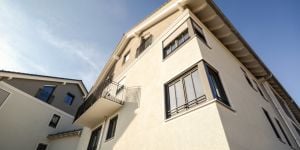
France's lifestyle, culture, and history bring in millions of visitors every year. Many fall in love with the country's beauty and decide to make France their long-term home to take advantage of jobs in growing industries, but finding housing in France can be a real headache, especially for foreigners. The process is complicated and slow, and it's even worse if your French employer can't help out with your application.
Finding accommodation in France
Like other major economies, France is dealing with a housing crisis, but optimists think the worst has passed and expect the market to start recovering in early 2024. Rents are skyrocketing, driven up by inflation. Paris is still the priciest city in France, averaging €9950 per square meter in 2024. The next two most expensive cities, Boulogne-Billancourt (€9319/m²) and Montreuil (€6853/m²), are also in the Paris region. Much further down the list, Villeurbanne ranks as the tenth most expensive city at €4020/m², far behind Paris. Villeurbanne is right next to Lyon, which is the fourth priciest at €5132/m².
At the other end of the scale, the cities with the least expensive real estate have rents ranging from around €1,300 to €2,400/m². Saint-Étienne is the most affordable (1308€/m²), followed by Perpignan (1484€/m²) and Limoges (1715€m²), but beware: "affordable rent" or "low rent" does not mean "dilapidated housing" or "insalubrious neighborhood". Le Mans is in the top 10 of France's most pleasant cities. Perpignan and Le Havre (9th least expensive city, at €2,274/m²) are also great places to live. While the capital and France's major cities (Lille, Lyon, Marseille, etc.) naturally come to mind, expatriation to Le Mans, Brest (5th least expensive city), or Nancy (10th) is also an option.
Choosing where to live in France
Due to zoning laws concerning amenities like schools and hospitals, it's important to carefully consider which neighborhood you prefer to live in.
Many websites offer a wide range of housing available to rent or buy. However, if you decide to secure and negotiate your accommodation in person, you'll need to have some command of French.
If you have trouble negotiating in French, contact a real estate agent. Big cities and industrial areas with many expats have plenty of agencies with multilingual staff. You pay the agency fees once you sign the contract. Many of these agencies also specialize in helping expats with extra services like setting up Internet, water, and electricity.
The agency will ask for a list of neighborhoods you like so they can find places that fit your criteria. While more agencies now offer virtual tours, it's still a good idea to see the place in person before moving in.
Real estate agencies are easy to find on the Internet: La Forêt, Century 21, Orpi, Immo de France, and FNAIM, among others. You'll also find international agencies like Talvan's or John Taylor.
If you need temporary accommodation, you've got options like hotels, bed and breakfasts, youth hostels, and rooms with local people... Websites like Booking.com or Airbnb can hook you up with some good deals. Just keep in mind that France has been cracking down on Airbnb lately, saying it's messing up the housing market, which is already tight on rentals. The government just passed a bill to restrict Airbnb that made it through the first round of votes on January 29, 2024.
Good to know:
Furnished rental is often more expensive than empty rental (rents are 10% to 15% higher on average, as they take into account the cost of furniture). Still, unfurnished rental does not mean "without any equipment". Many landlords include major furnishings (a fully equipped kitchen, for example).
Property rental conditions in France
The rental contract
The lease usually lasts for 3 years for unfurnished places. If you go with a furnished place instead, it will typically be for 1 year. The lease automatically renews, so you don't need to go into the landlord's office to sign a new one.
It is not compulsory to sign the rental contract in the presence of a notary, but it must be signed no later than the start date of the lease.
The rental contract must include:
- the exact date on which the apartment or house was transferred to the tenant;
- charges payable by the landlord and those payable by the tenant.
Rent usually doesn't cover utilities like water, gas, electricity, and phone. You'll have to set those up yourself or get your real estate agent to help you out. How much you pay for utilities depends on how much you use, where you live, and which provider you go with. The main utility companies in France are EDF, Engie, Total Energies, ekWateur, Eni, ilek, Sowee and Mint Energie.
When it comes to the Internet, you'll find a wide range of subscriptions to suit your needs. Many operators offer combined packages with telephone (mobile or landline), additional TV channels, or according to the speed you can receive (ADSL or Fiber). The main providers are Orange, SFR, Bouygues, Free, and Sosh.
The rent may increase each year based on inflation. Just so you know, in France, it's not legal to use the security deposit to cover the last couple of months of rent before you move out.
Inventory of fixtures
You'll need to inventory all the fixtures and appliances when moving in and out. The landlord must take care of certain repairs, like the water heater and windows, before you move in. They'll also handle those repairs during your lease if needed.
So make sure you read the rental agreement carefully and agree on everything with the landlord before signing. The inventory is super important because, in France, it's really hard to get your full security deposit back. To avoid any issues, we highly recommend leaving the apartment or house in the same condition as when you moved in.
Advance notice
If you're planning to move out, you need to give your landlord 3 months' notice by "registered letter with acknowledgment of receipt". If you end up leaving during the notice period, you still have to pay rent until your official move-out date. However, if there's an emergency, such as when you lose your job or get transferred back home, you can talk to your landlord and try to work something out with the notice and remaining rent payments.
Good to know:
Once you've moved into your home, your landlord can't come in without your permission. If there's a dispute and you can show your renter's rights were violated, you can get legal help. Check out the "useful links" section in this article for more info.
Rent prices in France
Rent prices usually depend on the neighborhood, type of housing, size, and amenities, but there's no standard pricing based on the number of bedrooms, floors, and so on. In 2024, the average rent across France was €13.6 per square meter. However, this average doesn't apply to every situation. Rent can be 10 or even 100 times higher depending on the city and neighborhood. The specific features of the property are also a factor in the price.
Finding student accommodation in France
France attracts a large number of foreign students every year. The Hexagone wants to compete with the countries most popular with foreign students (Canada, USA, etc.). From 2022 to 2023, France welcomed 310,800 foreign students.
France's popularity is creating a challenge: not enough student housing. There's a major shortage of places for students to live. The housing crunch is making things even tougher for students who are already struggling. They're competing with young workers for limited housing. A recent Senate report in 2021 said France needs 250,000 more student housing units. In December 2023, the government announced a plan to build 35,000 new student housing units, mostly in student residences, by 2027.
University residences are very popular and fill up fast since they are the cheapest option. They also provide accommodation on the outskirts of French universities. To apply for a spot, contact the Centre régional des œuvres universitaires et scolaires (CROUS). They help out all students, both French and international. Just go to the Mon logement Crous website to submit your housing application.
It's also possible to find an apartment or studio in the city where you'll be studying without going through the French university system. Visit general classified ad websites or sites dedicated to real estate:
Would you like to experience your expatriation differently? Sharing a flat is another way to find accommodation while keeping your costs down. If you don't speak French well, living in a shared apartment with French speakers will be an excellent way to learn the language. To find a flat-share in France, visit the following websites:
Don't hesitate to follow Facebook groups and pages dedicated to foreign students in France. Ads for student accommodation are often posted there.
Buying property in France
If you've decided to move to France permanently, are you thinking about buying property there? To find a place to buy, we recommend going through a real estate agent, especially if your French isn't great or you don't know much about the process, but if you're comfortable with how things work and can speak French well, you can also look at listings from private sellers and contact them directly.
Foreigners can buy property in France as long as they have a valid residence permit and meet the other requirements. It's a lot easier to get approved for a loan if you have a job in France.
If you come from an EU country and live in France
You can buy a property in France, but you must provide your bank or notary official documents, such as your birth certificate, family records, and foreign bank statements translated into French.
Coming from an EU member country but not resident in France
As for residents, make sure you send all documents requested by the bank (or any other organization managing the real estate transaction) translated into French. Bear in mind that your file may be considered more risky by the bank due to your non-resident status.
For residents, make sure to provide your bank or notary official documents, such as your birth certificate, family records, and foreign bank statements translated into French. The bank may consider your file more risky due to your non-resident status.
Coming from outside the EU
You must have obtained a long-stay visa and/or residence permit in France. You will also be processed by the bank's special service.
Just like with renting, the price of buying property in France varies a lot depending on where you're looking. Of course, prices in Paris will be very different from prices in Strasbourg. On average, you can expect to pay around €9,950 per square meter in Paris compared to only €3,743 per square meter in Strasbourg. Cities like Clermont-Ferrand and Besançon are even more affordable, with average prices of €2,207 and €2,226 per square meter. So it comes down to your plans (do you have a job lined up?), what you can afford, and what you're looking for in a property.
Useful links:
National agency for housing information
We do our best to provide accurate and up to date information. However, if you have noticed any inaccuracies in this article, please let us know in the comments section below.








